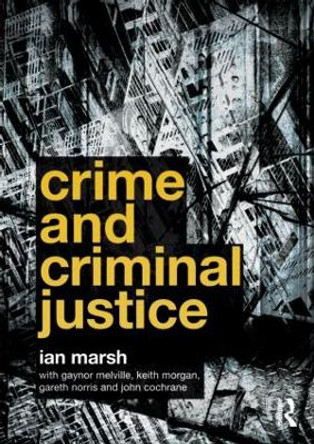Description
Criminal Justice in the United States is in the midst of momentous changes: an era of low crime rates not seen since the 1960s, and a variety of budget crunches also exerting profound impacts on the system. This is the first book available to chronicle these changes and suggest a new, emerging model to the Criminal Justice system, emphasizing:
- collaboration across agencies previously viewed as relatively autonomous
- a focus on location problems and local solutions rather than a widely shared understanding of crime or broad application of similar interventions
- a deep commitment to research which guides problem assessment and policy formulation and intervention.
Ideal for use in graduate, as well as undergraduate capstone courses.
About the Author
John M. Klofas is professor of criminal justice, chairperson of the Department of Criminal Justice at Rochester Institute of Technology and Director of the Center for Public Safety Initiatives (CPSI).
Natalie Kroovand Hipple is a Research Specialist at the School of Criminal Justice at Michigan State University.
Edmund F. McGarrell is Director and Professor of the School of Criminal Justice at Michigan State University.
Reviews
"This extraordinary volume presents a description of a new cutting edge model of research on crime and our society's efforts to reduce it. This work demonstrates that the criminal justice system is not a single funnel but a series of locally determined problems and locally crafted crime control responses that together determine CJ policy."-John McDevitt, Institute on Race and Justice, Northeastern University
"The New Criminal Justice proposes a model of cooperation and collaborative problem solving organizations that stresses multiplicative power rather than additive power, local focus rather than standardization and action research rather than basic research. This book will give students a much deeper appreciation of the complexities of the criminal justice system beyond the more simplistic systems approach."-James Meeker, Criminology, Law & Society, University of California, Irvine
"Klofas, Hipple, and McGarrell have expertly assembled an important collection of readings. These innovative articles together in one volume paired with helpful section overviews and discussion questions makes this a vital contribution to the field, and presents a possible paradigm switch in the way we should think about criminal justice."-Geoffrey Alpert, Criminology and Criminal Justice, University of South Carolina
"John Klofas, Natalie Hipple and Ed McGarrell have compiled an excellent volume, far more than just a collection of chapters. Like many edited books, there are outstanding contributions, with important findings and policy statements. Unlike most edited books, however, this volume highlights one of the most important new themes in criminal justice in the past decade. It is not an overstatement to say that this book lays out the model for the new criminal justice."-Scott H. Decker, Director,Criminology and Criminal Justice, Arizona State University
"This extraordinary volume presents a description of a new cutting edge model of research on crime and our society's efforts to reduce it. This work demonstrates that the criminal justice system is not a single funnel but a series of locally determined problems and locally crafted crime control responses that together determine CJ policy."-John McDevitt, Institute on Race and Justice, Northeastern University
"The New Criminal Justice proposes a model of cooperation and collaborative problem solving organizations that stresses multiplicative power rather than additive power, local focus rather than standardization and action research rather than basic research. This book will give students a much deeper appreciation of the complexities of the criminal justice system beyond the more simplistic systems approach."-James Meeker, Criminology, Law & Society, University of California, Irvine
"Klofas, Hipple, and McGarrell have expertly assembled an important collection of readings. These innovative articles together in one volume paired with helpful section overviews and discussion questions makes this a vital contribution to the field, and presents a possible paradigm switch in the way we should think about criminal justice."-Geoffrey Alpert, Criminology and Criminal Justice, University of South Carolina
Book Information
ISBN 9780415997287
Author John Klofas
Format Paperback
Page Count 192
Imprint Routledge
Publisher Taylor & Francis Ltd
Weight(grams) 360g








